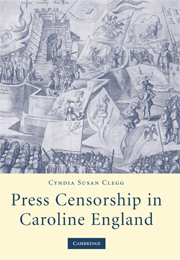Book contents
- Frontmatter
- Contents
- Acknowledgments
- Chapter 1 Censorship and the law: the Caroline inheritance
- Chapter 2 Print in the time of Parliament: 1625–1629
- Chapter 3 Transformational literalism: the reactionary redefinition of the courts of High Commission and Star Chamber
- Chapter 4 Censorship and the Puritan press
- Chapter 5 The printers and press control in the 1630s
- Chapter 6 The end of censorship
- Notes
- Bibliography
- Index
Chapter 3 - Transformational literalism: the reactionary redefinition of the courts of High Commission and Star Chamber
Published online by Cambridge University Press: 22 September 2009
- Frontmatter
- Contents
- Acknowledgments
- Chapter 1 Censorship and the law: the Caroline inheritance
- Chapter 2 Print in the time of Parliament: 1625–1629
- Chapter 3 Transformational literalism: the reactionary redefinition of the courts of High Commission and Star Chamber
- Chapter 4 Censorship and the Puritan press
- Chapter 5 The printers and press control in the 1630s
- Chapter 6 The end of censorship
- Notes
- Bibliography
- Index
Summary
In The Original and Growth of Printing (1664) Richard Atkyns looked with considerable nostalgia to an earlier era – before the collapse of the court of Star Chamber – when an ordered kingdom derived from a controlled press. “Printing,” he says, “is like a good Dish of Meat, which moderately eaten of, turns to the Nourishment and health of the Body; but immoderately, to Surfeits and Sicknesses: As the Use is very Necessary, the Abuse is very dangerous.” Atkyns had a ready means to control un unruly press – punishment. “How were the abuses [of printing] taken away in Queen Elizabeth, King James, and the beginning of King Charles his time, when few or no Scandals or Libels were stirring? Was it not by Fining, Imprisonment, Seizing the Books, and breaking the Presses of the Transgressors, by Order of Councel-Board?” Despite Atkyns's nostalgia, in 1641 England was rife with criticism of both the Star Chamber and High Commission. Addressing Parliament, Charles Howard, Earl of Berkshire's remarks reflect the spirit of the times:
Your Lordships well know, there was a statute framed, tertio H7. authorizing … the Kings Councell to receive complaints upon Bill, or Information; and cite such parties to appeare, as stand accused of any misdemeanour: And this was the Infancy of the Starre-Chamber … from whence being altogether unlimited, it is growne a monster, and will hourely produce worse effects …
- Type
- Chapter
- Information
- Press Censorship in Caroline England , pp. 99 - 122Publisher: Cambridge University PressPrint publication year: 2008



